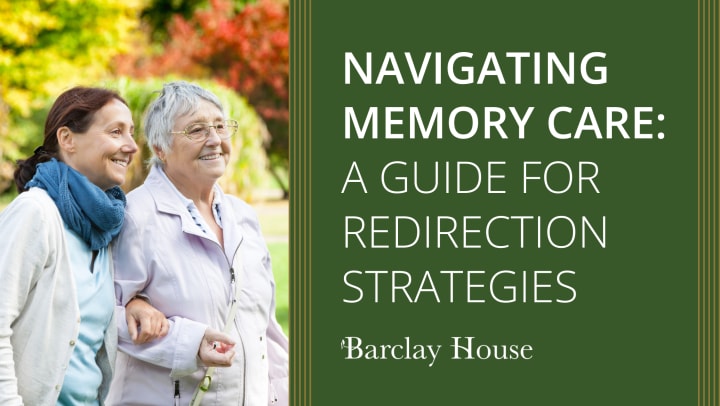Living with Alzheimer’s or dementia presents numerous challenges, not only for the individual affected but also for their loved ones. One of the most distressing aspects is the range of emotions and behaviors that can arise, including anger, anxiety, confusion, and fear. Attempting to reason or explain to someone experiencing these symptoms often proves futile, leading to further frustration for both parties.
When situations like these arise, a technique called "redirection" has been shown to be extremely effective. Redirection involves shifting the individual's attention away from the triggering situation or emotion to a more positive or calming alternative.
For those with cognitive impairments or dementia, redirection serves as a gentle yet effective tool to navigate challenging situations and emotions. Here are several ways to redirect a loved one with Alzheimer’s or dementia:
Validate Their Feelings:
One of the fundamental aspects of redirection involves acknowledging and validating the emotions of those in our care. Whether it's confusion, frustration, or sadness, offering empathy and understanding can provide immense comfort. By affirming their feelings, we create a safe space for expression, fostering trust and connection.
Practice Using Bridge Phrases:
Bridge phrases serve as verbal connectors, gently guiding conversations toward more positive or neutral topics. Phrases like, "I understand how you feel, let's try this instead," or "That sounds difficult, let's focus on something else for now," can help effectively steer discussions away from distressing subjects while maintaining a strong connection.
Give Them a New Focal Point:
Redirecting attention towards a new focal point can help shift focus away from negative thoughts or behaviors. Introducing engaging activities, such as puzzles, crafts, or music, can capture their interest and provide a distraction from the stressful environment or emotions they are feeling. By offering stimulating alternatives, we also help promote a sense of purpose and enjoyment within their daily routines.
Watch Their Nonverbal Cues:
Nonverbal communication often speaks volumes, especially for individuals with cognitive impairments. Paying attention to their body language, facial expressions, and gestures can offer valuable insights into their emotional state. If signs of agitation or discomfort arise, gently guide them toward a calmer environment or activity to help shift their attention.
Change of Scenery:
Sometimes, a change of scenery can work wonders in diffusing tension or restlessness. Whether it's stepping outside for a breath of fresh air or relocating to a different room, a new environment can provide a refreshing perspective and help alleviate feelings of confinement or agitation.
Assess the Current Environment:
Creating a supportive environment is crucial for promoting well-being and reducing stress. Assessing factors such as noise levels, lighting, and clutter can help identify potential triggers. By optimizing their surroundings, we can create a calming and conducive space for redirection strategies to flourish.
Keep It Simple:
In the midst of redirection, simplicity reigns supreme. Complex instructions or explanations may overwhelm individuals with cognitive impairments, leading to further frustration or confusion. Instead, opt for clear and concise communication, using familiar language and visual cues whenever possible.
By implementing these strategies and making sure to validate their feelings, we can create a nurturing and supportive environment where individuals can thrive despite the challenges they may face. Redirection is a wonderful way to help diffuse certain situations and bring a sense of peace to those struggling with memory impairments. Remember, you are not in this alone; we are always here to help.









